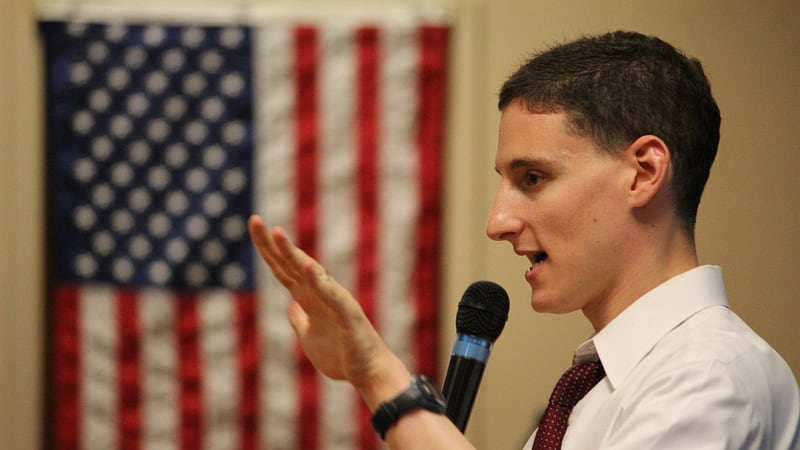If any Republican candidate could have broken the decades-long Democratic hold on the Jewish vote, it would have been Ohio senatorial hopeful Josh Mandel. For a moment, Mandel’s personal background and local relationships looked poised to cast the alliance asunder.
Son of the Cleveland Jewish Community Relations committee chair, former student body president of Ohio State, and a Marine veteran who did two tours in Iraq, Mandel had such an impeccable pedigree that he ran as a Republican for state representative in a heavily Democratic suburb and won with 72 percent of the vote. He won his 2010 State Treasurer race with more votes than any other statewide candidate, garnering attention for his fundraising abilities and crossover appeal based on his connections in the liberal bastion of Cuyahoga County.

During his Senate race, though, the aspirations of some neoconservatives and groups like the Republican Jewish Coalition appear to be faltering under the weight of a connection most American Jews draw between Jewish identity and liberalism. During a recent week in the Beachwood and Shaker Heights neighborhoods of Cleveland, I found that local Jews' views track with national data placing economic justice and social welfare as American Jews' paramount political and religious values. When I asked Mandel about the discrepancies between his politics and those of the mainstream of American Jewry, he replied, "You need to understand that there's a Jewish community outside of the Upper West Side of Manhattan."
One prominent Cleveland Jewish leader, who asked to remain anonymous, “confessed” that Mandel remains the only Republican to receive a campaign contribution from him. “I thought he was a nice Jewish boy, someone whose parents I knew, and he was running for a city council seat," he said. "But now I’d like my fifty dollars back."
In his campaign for Senate, Mandel keeps slipping in the polls despite nearly $18 million support from groups like the Chamber of Commerce and Karl Rove’s Crossroads GPS, in addition to enjoying a home-court advantage. In statewide polls, Mandel is losing 53 percent to 41 percent to the incumbent Democrat Sen. Sherrod Brown. Yet the starkest contrast comes from his base-to-be, Jews who might be willing to vote for one of their own: in polls conducted by Cleveland Jewish News (CJN) of its readership, Brown now leads those polls 81 percent to 18 percent, up from 76 percent in May.
Marilyn Karfeld, a retired reporter for the CJN said, “I was surprised by the polls. I thought Jews would come out to vote for Josh, but many of the responses came with comments, most of which were strongly pro-Brown and anti-Mandel.” One respondent commented, “I will always take a second look at a Jewish candidate, but I cannot support a Jew whose positions are totally opposite from mine.”
With an endorsement from the National Right to Life PAC and strong opposition to gay marriage, Mandel’s strongly conservative positions alienated him from many Jewish voters. When I asked Mandel about gay marriage, which 81 percent of American Jews support, he said, "You've read the Torah, right? So you know the Torah defines marriage as being between one man and one woman." (Portrayals of marriage in the Torah are more complicated than Mandel's reading, including depictions of polygamy.)
A Mandel advisor, who requested anonymity, commented to Open Zion that “Josh has unfairly become a pariah in the Jewish community for his views on social issues.” But Jewish voters seemed most concerned with Mandel’s growing reputation for sleazy campaign tactics. With a record of eight “Pants on Fire” ratings from PolitiFact Ohio (for statements “both false and patently ridiculous”), a columnist at the Columbus Dispatch termed Mandel “the candidate of the big lie, continually making statements and airing ads that stretch the truth or are patently untrue.”
When it came to Jewish votes, Mandel torpedoed his boy-scout-next-door appeal by aggressively going on offense regarding Brown’s credibility in the Jewish community. His campaign claimed that “Sherrod Brown and President Obama have lost the faith of Jewish Democrats.” Mandel told me that Brown’s extensive support from J Street made him “more of a Palestinian sympathizer than a true friend of Israel."
Yet even Mandel’s supporters say that on Israel, Brown’s record is near impeccable and the issue is essentially neutralized, particularly in light of Brown’s endorsement from former AIPAC President and Cleveland businessman Tim Wuliger. Meanwhile, Brown shored up Jewish surrogates and endorsements based on his history with Northeast Ohio’s Jewish community.
“Sherrod has strong and deep ties to the Jewish community that go back decades," said Former Lieutenant Governor Lee Fisher, himself a Jewish politician with a distinguished record in elected statewide office. "The Brown campaign, early on, focused a significant deal of attention to shoring up their support in the Jewish community." He added: "He did a very effective job of making that clear through a series of ads, with Jewish voters staying with him despite the presence of Josh in the race.”
If Mandel can’t succeed in his home county, where he might have otherwise gained his margin of victory, Jewish Republicans nationwide may have to reassess their strategy for realigning the Jewish vote. “With Mandel, we see someone who’s one of our own who we believe is dishonest and pandering—and then it’s more personal," said Mitchell Cronig, an aerospace engineer active in both Democratic campaigns and Jewish community organizations. "I’m proudly voting against a Jewish candidate because I want to support my principles above just voting for the Jew."
With Mandel's inability to make inroads with Jewish voters—despite his compelling posture as a young, Jewish conservative from the neighborhood—those hoping the GOP can make inroads among American Jews may need to prepare themselves for the possibility that, as go Ohio’s Jews, so still goes American Jewry.






